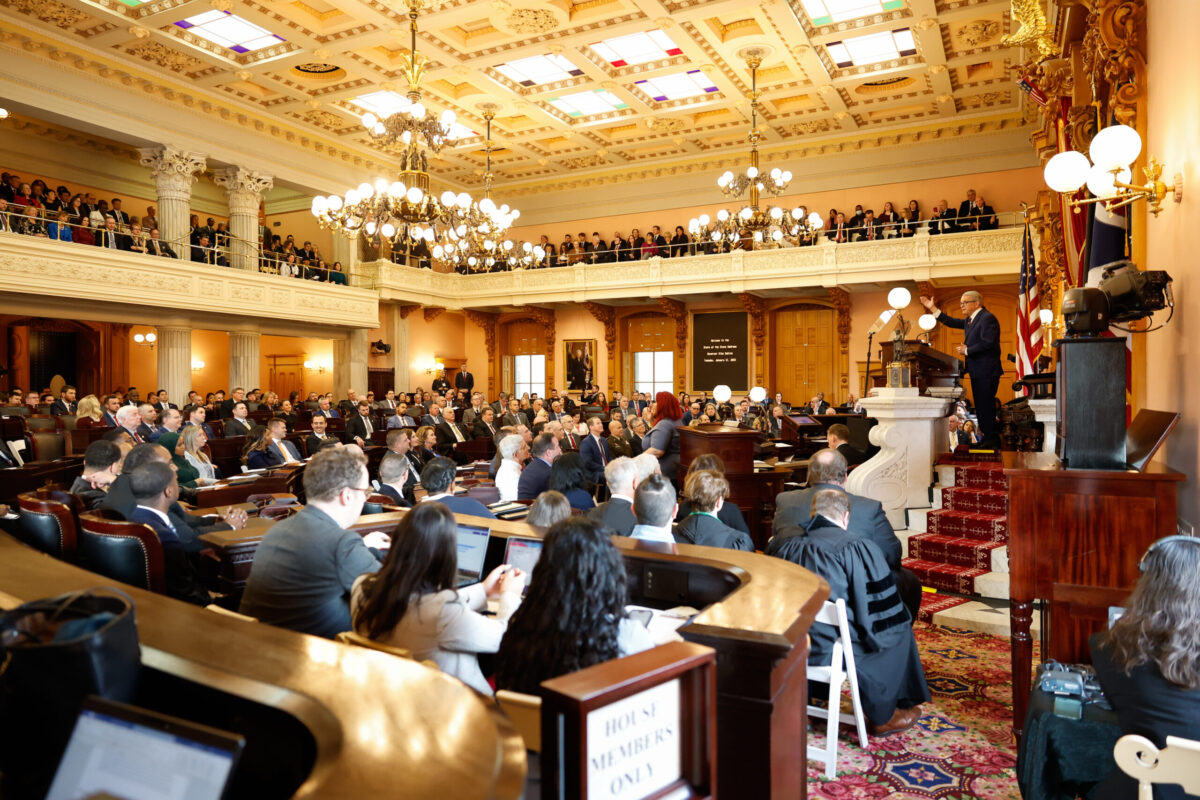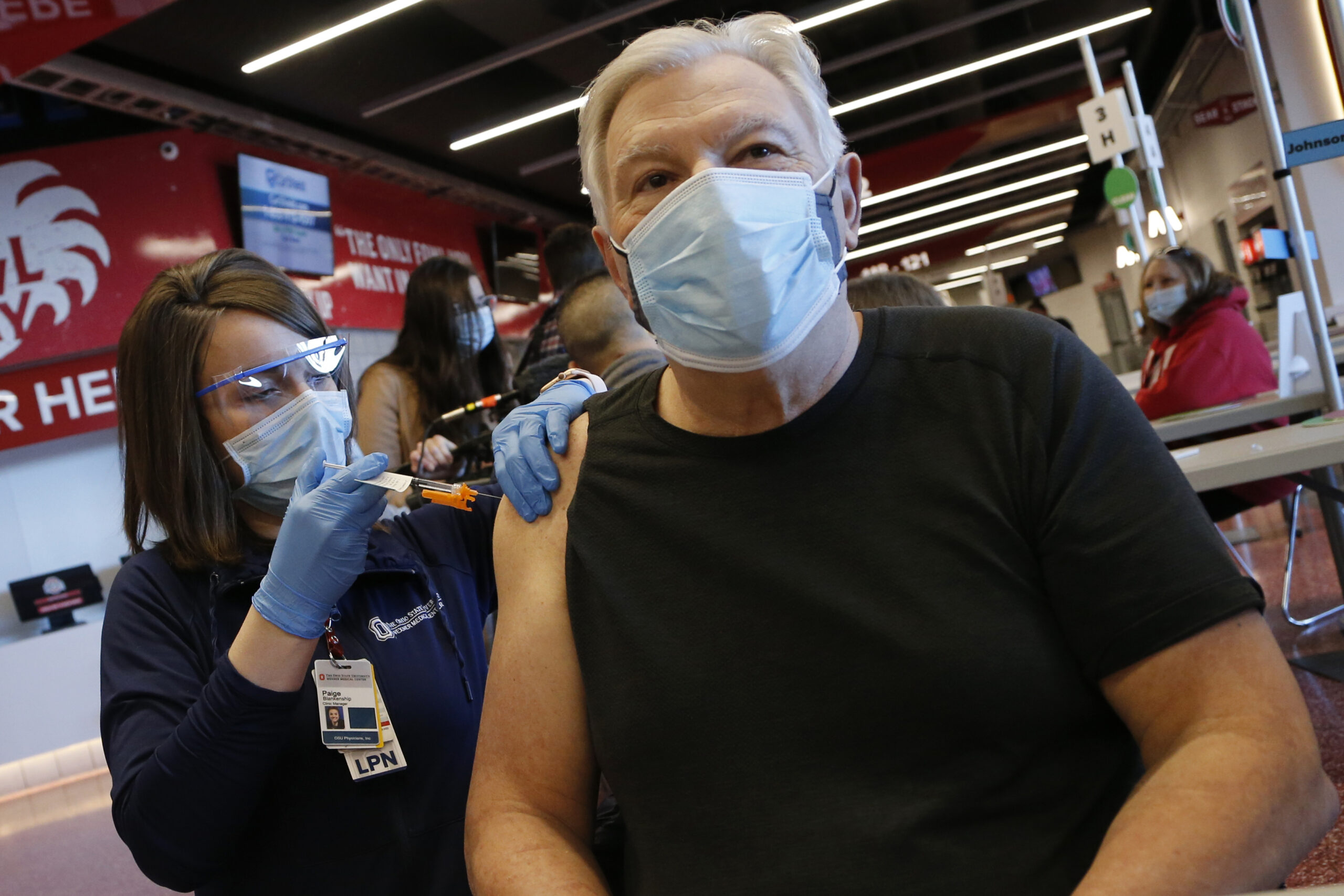By Susan Tebben, Ohio Capital Journal
Ohio Governor Mike DeWine made clear Tuesday that his priorities during this budget cycle center on child literacy, mental health, and spending to bring in big business.
In his annual State of the State address to a joint meeting of the General Assembly, DeWine announced big money moves included in his proposed budget, including $2.5 billion in one-time monies to ready construction sites for major business, and per-child tax credits he says will help bring better health and education outcomes.
“Our future is bright — but that future will be defined by how well we educate all our children and how we tear down the barriers to their success,” DeWine said.
Education
Among his proposals for the budget — that will now be dissected by the General Assembly as both the House and Senate come up with their own priorities and spend the spring and summer negotiating — is a $2,500 per-child state tax deduction, along with a repeal of the state sales tax on “critical infant supplies,” like diapers, car seats, and strollers.
He also wants to incentivize high schoolers to stay in Ohio for post-secondary education by offering the top 5% in every high school a $5,000 renewable annual scholarship if they attend a college or university in the state.
DeWine also looked toward the adoption system in Ohio, saying his budget would “make it easier for families to adopt children into safe, loving, permanent homes,” and give them access to Medicaid coverage even if a child is adopted through a private agency.
The governor’s budget also pledge to address underlying issues for children and families in Ohio with affordable housing tax credits for low-income family and single-family houses.
And as the legislature mulls over a restructuring of the education system in Ohio which would include renaming the Department of Education and putting its director under the governor’s cabinet, DeWine hopes to take a similar tack with children services.
With the proposed Department of Children and Youth, DeWine said he wants to consolidate programs from six other state agencies, focusing on maternal and infant physical health, the foster care system, and early childhood education.
“The issues impacting the lives of our children are simply too important to leave scattered throughout multiple agencies, without a member of the governor’s cabinet driving them each and every day,” DeWine said.
The governor brought up an overhaul of the state public school funding formula, called the Cupp-Patterson plan and the Fair School Funding formula, which he said he wants to see funded. The plan has seen two years of funding from the legislature so far, but was designed as a six-year phase-in, complete with studies on the real cost of educating children, and specific aims for economically disadvantaged and special education students.
But DeWine also pushed for expansions to the EdChoice private school vouchers, criticized by public school advocates and Democrats as a drain on money public schools desperately need.
His budget would also increase facilities funding for charter schools, from $500 to $1,000 per student.
DeWine did not make any moves toward gun safety efforts, even as he spoke about school safety.
“One of the things families never used to worry about was the safety of their children at school,” DeWine said. “Today, sadly, they do.”
What the governor did propose is state funding for any school to have a school resource officer present in their buildings, even if they can’t afford to do so on their own.
“We also want to do this because, oftentimes, there is a trust that gets built between students and the officer that would not otherwise occur — but for that officer being in the school each day,” DeWine said.
The proposal comes the year after DeWine signed a bill to allow teachers to be trained and armed during the school day if a school district approves it.
DeWine also encouraged an expansion of the state’s School Safety Center, which patrols social media for threats to schools and students and houses an anonymous tip line.
Mental health and policing
The governor also used his State of the State address to emphasize the need for a community mental health system, something long missing from Ohio.
“We must not accept that mental illness and addiction are inevitable,” DeWine said.
The budget proposals DeWine will bring to the legislature focus on increasing prevention, crisis response, treatment and the behavioral health workforce, he said.
Amidst those increases, he said, should be the creation of the State of Ohio Action for Resiliency Network (SOAR), to “harness the talent of our citizens to deploy a first-of-its-kind, comprehensive, multi-year research study that includes Ohioans from all regions of our state,” according to the governor.
“It will help us understand the unique nature of mental health issues across Ohio’s urban, suburban, rural and Appalachian communities to better determine which interventions work best in our many diverse communities,” he said.
Connected to mental health are DeWine’s proposals for the public safety sector, where his budget pledges $40 million per year for “continuous training for Ohio law enforcement officers on topics ranging from de-escalation to use-of-force to crisis intervention for someone with a mental illness.”
The governor didn’t mention 29-year-old Tennessee resident Tyre Nichols, who died three days after being severely beaten by five Memphis Police Department officers, who now face murder and assault charges connected with the beating. But he did touch on the importance of body cameras for law enforcement.
“Recent events have once again shown us how important body camera footage can be, as well as the critical need for ongoing training for our law enforcement officers,” DeWine said.
Bringing big business
Ohio is “truly on the move,” he said, when it comes to recruiting big businesses to the state. He raved about advancements in business, like Intel’s incoming plant in Licking County, Honda’s plans to expand into Fayette County, and electric vehicle manufacturing plans from Ford in Avon Lake and GM in Toledo.
But the state has more sites that could be developed, if only they were ready.
“We simply don’t have enough shovel-ready, development-ready sites for the kind of calls we are getting from companies all over the world,” DeWine said.
With that in mind, DeWine plans to use $2.5 billion in one-time funds “to prepare the infrastructure of large economic development sites located in every single part of Ohio.”
Democrat response
In a joint press conference immediately after DeWine’s State of the State, House and Senate Democrats said the governor and the legislature need to push a budget that puts the people at the forefront, but does not take more money away from public schools.
Senate Minority Leader Nickie Antonio said the State of the State highlighted some of Ohio’s strengths, but also “shed light on things we must improve upon.”
“We seek a budget that works for everyone, a budget that puts the people first,” Antonio said. “We need a budget that will create ladders of opportunity and pathways to success for all Ohioans, especially our children.”
House Minority Leader Allison Russo said well-resourced classrooms and a full financing of the Fair School Funding Plan should be top of mind as legislators head into the budget process.
“We can’t afford to move forward any legislation that would take funding away from our public schools, and we for sure can not afford to prop up with taxpayer dollars any voucher system that lacks transparency, accountability and which teaches hate to children,” Russo said, seemingly referencing a small group of Ohio homeschooling parents who were reported to have use neo-Nazi content in their curriculum.
The Democrats also argued that Ohio must focus on safe and affordable housing for families to bring about economic development and increase residency.










